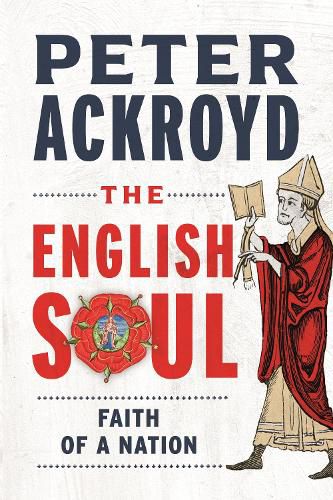The English soul: Faith of a nation by Peter Ackroyd

Peter Ackroyd CBE, FRSL is a renowned Yale-educated English biographer, novelist and critic with a specialist interest in the history and culture of London (Wikipedia). In The english soul: Faith of a nation, Ackroyd takes the reader on a chronological journey of Christianity in England from The Venerable Bede (673-735) to contemporary belief and practice.
The english soul: Faith of a nation, like the other books in Ackroyd's prodigious volume of work, is meticulously researched and written by one who lives and breathes and has made a lifetime's study of English history and culture; by someone who is deeply immersed in the study of "the English soul" and "the faith of the nation." Ackroyd's biographies and narratives including but definitely not limited to London;The biography, Foundation: The history of England from its earliest beginnings to the Tudors, Tudors:The history of England from Henry V111 to Elizabeth 1, Rebellon: The history of England from James1 to the glorious revolution, Shakespeare: The biography and Dickens have been thoroughly researched. Due to a lifetime of immersion in London and in academia, Ackroyd's grasp of the subject matter is broad and deep with natural and spontaneous connections being made across disciplines of knowledge particularly History and Theology. The english soul: Faith of a nation is firmly rooted in place (England) and stretches across time. The book tracks the major movements and great persons through English history that have contributed to the development of religion over time. Invariably each person is rooted in a particular place and time - assimilating, building upon or rejecting and opposing influence from the past and contributing towards the contemporary English soul. This is largely (but not totally) the process of the understanding of the English soul that Ackroyd depicts - a soul that assimilates and rejects other ideas from outside, that is rooted in place, that remains for the most part pragmatic, that is fluid enough to gather up what works from many widely differing movements and is born of history and tradition, of scripture, of reason and experience. Being less reliant on dogma than other "souls" or "faiths" the possibility in contemporary times is that the English soul will, having survived for so long because of its "via media", be swallowed by external religions and movements and/or collapse from internal unrest and schism. Ackroyd states in the Author's Note, "This study is an account of the Christian English soul, which accepts the fact that Christianity has been the anchoring and defining doctrine of England."
Each of the twenty-three chapters look at religion in a different light and focuses on a representative theologian, or poet, or movement. Thus commencing with one Religion as History: The Venerable Bede, Ackroyd continues with Religion as Revelation, as Reform, as Reformation, as Orthodoxy, as Opposition, as Sermon, as Scripture, as Poetry, as Order, as Sect, as Transformation, as Experience, as Revival, as Individual, as Established, as Battle, as Thought, as Evangelical, as Argument, as Contemporay, as Theology etc. Each approach is married with its leading figures including, Julian of Norwich, Wyclif, Tyndale, Cranmer, Foxe, Hooker, Cartwright, Browne, Barrow, Andrewes, Herbert, Blake, Laud, Bunyan, Dawkins, Spurgeon etc, etc.
At all times, Ackroyd remains with the reader. Far from dryly reciting events and facts, he actively engages. For example... (on Wyclif and his promotion of an English faith separate from Rome with the monarch at its head and reliance upon scripture and individual Christian devotion)..."It is a compelling theme that, as we shall observe, resounded through the centuries." This kind of inclusion of the reader continues throughout with the freqent use of "we". Many, many extracts could be quoted. One such that goes to the core is the battle between Travers and Hooker in the 1580s... referring to the battle of the pulpits between Geneva and Canterbury as being..." the battle for the English soul. It was not concluded then, and still exists now." Delving deep into sermons and materials from the past, Ackroyd finds and quotes from Andrewes "Spital sermon"..."every dunce took upon him to usurp the pulpit...throwing forth headlong their incoherent, misshapen and evil-smelling crudities...the very church is infested with as many fooleries of discourse as are commonly in the places where they shear sheep." The King James Bible, published in 1611 has been described as "the most influential version of the most influential book in the world" and "the most important book in English religion and culture". Ackroyd states that it ..."is impossible to use the English language without being influenced by its cadence and vocabulary...It is significant, too that (it) was produced out of compromise and conciliation...It might even act as a mirror of Englishness itself, and by extension of the English soul."
Ackroyd acknowledges his two research assistants, Thomas Wright and Murrough O'Brien and indeed, the quality and range of research, being so extensive would seem to require much assistance. Illustrative material has been sought from a range of acknowledged resources, the index is extensive and the book structure is such that information is easily retrievable. Ranging far and wide, with satisfying depth and engaging narrative, The english soul: Faith of a nation is a treasure trove of information, historical research and contemporary commentary. Highly recommended for those interested in English History, Theology and Christianity, this book is a must for theological colleges and university libraries.
Themes: Theology, English History, Christianity.
Wendy Jeffrey